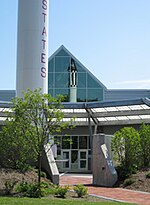Leavitt Farm

Leavitt Farm is a historic farmstead at 103 Old Loudon Road in eastern Concord, New Hampshire. It consists of three 19th century farm buildings, including the c. 1847 Greek Revival farmhouse, a large c. 1888 shop and barn, and a 19th-century privy which has been converted into a well pumphouse. These buildings were built by Jonathan Leavitt, a farmer and blacksmith, and were later owned by his son Almah, a sign painter. In the 1980s the property was used by the Concord Coach Society (now the Abbot-Downing Historical Society) as a headquarters and museum facility. The shop building in particular is notable for its adaptive reuse (as blacksmithy, paint shop, and museum), and for its second floor ballroom space, an unusual location for that type of social space. The property was listed on the National Register of Historic Places in 1982.
Excerpt from the Wikipedia article Leavitt Farm (License: CC BY-SA 3.0, Authors, Images).Leavitt Farm
Old Loudon Road, Concord
Geographical coordinates (GPS) Address Nearby Places Show on map
Geographical coordinates (GPS)
| Latitude | Longitude |
|---|---|
| N 43.232222222222 ° | E -71.481111111111 ° |
Address
Old Loudon Road
Old Loudon Road
03301 Concord
New Hampshire, United States
Open on Google Maps










